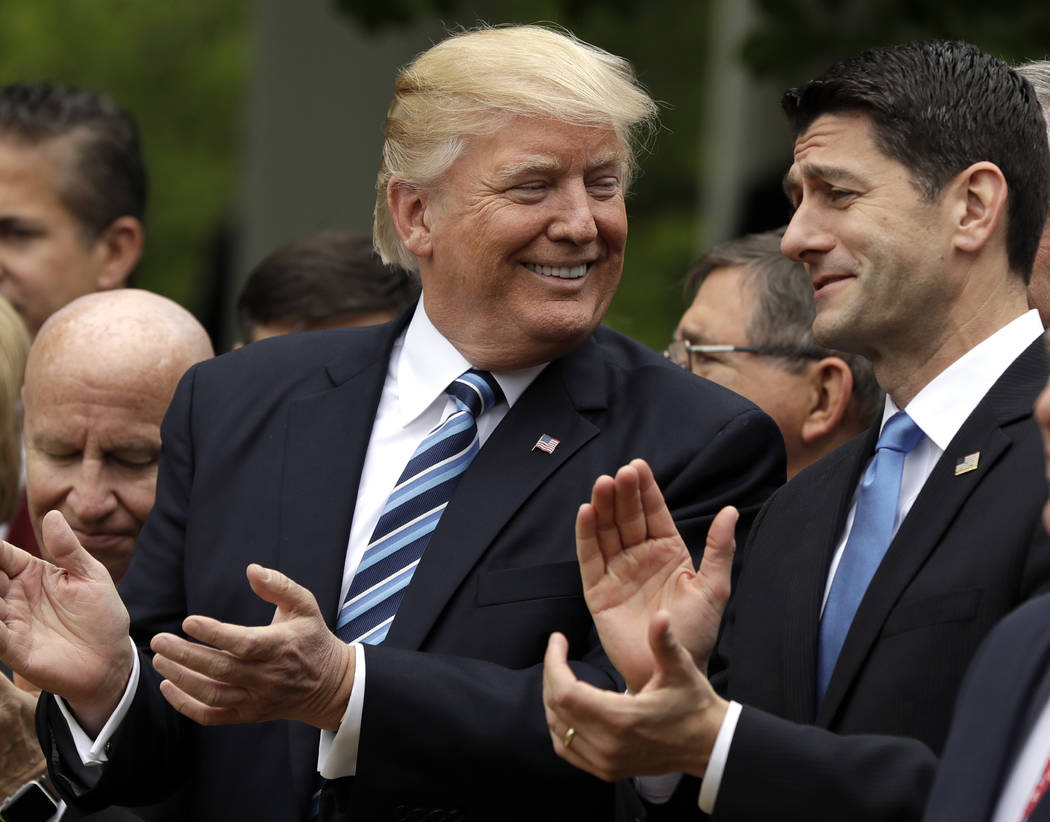Health care bill faces obstacles in Senate
WASHINGTON — A Republican health care bill passed by the House and celebrated in the Rose Garden by President Donald Trump, was met with a shrug in the Senate, where lawmakers will begin writing their own version of legislation to tackle pressing problems.
“I congratulate the House on passage of its bill,” said Sen. Lamar Alexander, R-Tenn., the chairman of the Senate Health, Education, Labor and Pensions Committee.
“The Senate will now finish work on our bill, but we will take the time to get it right,” he said.
The House rushed through its bill, putting it on the floor after GOP leaders slapped on last-minute amendments and Trump administration officials cajoled enough lawmakers to secure a 217-213 victory.
Trump, in a celebration with House Republicans in the Rose Garden this week, said, “we’re going to get this passed through the Senate. I feel so confident.”
On Friday, a White House spokeswoman tempered the administration’s enthusiasm saying the White House would not put a hard deadline on the Senate to act.
The difficulty that House GOP leaders had in mustering the votes to repeal and replace the Affordable Care Act, commonly known as Obamacare, will face Senate Republicans who hold a slim 52-48 majority and thus have little room for defection.
Democrats oppose repeal of President Barack Obama’s signature legislation that was passed along strict party line votes in both chambers in 2010.
And provisions that were tucked into the House repeal bill, the American Health Care Act, were embraced by conservatives but dismissed by moderate GOP lawmakers in the Senate.
Planned Parenthood
Taking those measures out risk losing support of Republican conservatives like Sens. Ted Cruz of Texas, Sen. Mike Lee of Utah and Sen. Rand Paul of Kentucky.
Senate Majority Leader Mitch McConnell, R-Ky., admitted the process wouldn’t be easy in the Senate, but “we’ll continue to work on it.”
One of the largest obstacles ahead is a provision in the House bill that defunds Planned Parenthood, which provides women health care services like cancer screening and birth control.
Left intact, that measure would likely draw opposition from Republican Sens. Susan Collins of Maine, Lisa Murkowski of Alaska and Shelley Moore Capito of West Virginia.
Collins, who sits on the health committee, said she would continue to review the House bill, but at this point, she said, “there seem to be more questions than answers about its consequences.”
It also raises the political stakes on the Republicans’ two most vulnerable senators, Dean Heller of Nevada and Jeff Flake of Arizona.
At a Reno town hall meeting last month, Heller told a boisterous crowd: “I have no problem with federal funding for Planned Parenthood.” But his office later issued a statement backing off of that claim and noting Heller’s long history of voting against federal funding for organizations that provide abortion.
Planned Parenthood is running television advertisements in those states. In Nevada, the ad shows a clip of Heller speaking at the town hall and says: “Call Senator Heller and tell him to keep his word.”
Meanwhile, Heller has already come out against the House legislation, saying it “falls short.”
Medicaid cuts
Heller is part of a large number of GOP senators who are opposed to the $880 billion in cuts to the Medicaid program in the House bill.
Under Obamacare, states were encouraged to expand Medicaid eligibility, with the federal government picking up the full cost for the initial years and dropping to 90 percent after 2020.
Nevada and 30 other states expanded the program, which amounted to an additional 400,000 people in the Silver State covered under the Medicaid program.
The House bill would cut eligibility, and reduce federal reimbursement to states.
Nevada Gov. Brian Sandoval and other Republican governors voiced their concern to Trump and to Congress. They said the proposed cuts would shift financial obligations back to the states and reduce coverage for Medicaid recipients.
Heller said the House bill would “pull the rug out” from under states that expanded Medicaid.
“I remain engaged with Governor Sandoval and Leader McConnell on the issue as the Senate works toward a path forward,” Heller said.
GOP senators were also cautious about support for a House bill that was passed without knowing how much cost savings the legislation would produce, or its impact on coverage. It contained a provision that would allow states waivers to opt out of mandates on insurers to accept applicants with pre-existing conditions.
Senators said they will wait for the non-partisan Congressional Budget Office to provide a cost analysis of the revamped House bill, and its impact on coverage.
A CBO analysis of the first House version of the Republicans’ bill, before the most recent amendments were added, said it would increase the number of uninsured by 24 million.
Alexander said he would continue working on a Senate bill to rescue millions of Americans who are trapped in collapsing exchanges in the Affordable Care Act.
Alexander said the bill would give states more flexibility on Medicaid and ensure that people with pre-existing conditions have access to insurance.
Contact Gary Martin at 202-662-7390 or gmartin@reviewjournal.com. Follow @garymartindc on Twitter.
Political red flags
The House health-care bill has a few potential stumbling blocks for the Senate:
— Removes pre-existing condition protections contained in the Affordable Care Act. Allows states to receive waivers to the mandate for insurers to sell policies to people with health problems and not charge a higher rate.
— Defunds Planned Parenthood, the organization that provides women health care services that include cancer screenings, birth control and counseling.
— Cuts Medicaid spending and alters funding formulas to states that expanded eligibility to the program under the ACA.
— Lacks a cost and coverage analysis by the non-partisan Congressional Budget Office.
Source: U.S. House of Representatives, Kaiser Family Foundation and the Associated Press.





























